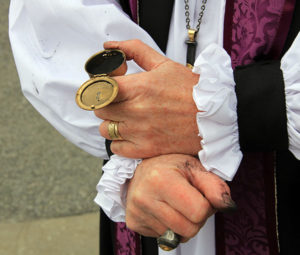 Ash Wednesday 2019
Ash Wednesday 2019
Dear Friends in Christ,
Once again as Lent begins, countless Christians will receive the mark of the Cross traced on their foreheads, hearing the words, “Remember that you are dust, and to dust you shall return.” With this simple gesture and these solemn words, we set out on our pilgrimage toward Easter.
Where is the good news in this stark beginning?
There is no question that we are dust — that is, mortal and frail, both in body and soul. If we are young, we are taken aback by unexpected obstacles in our path, by unforeseen defeats, by friendships that go south or romance that disappears. If we are older, we are shaken by the onset of illness, by a loss recently endured or long remembered, by the rapid passing of days. At any age, we are brought up short by the sin we thought we had gotten beyond. We lose sleep over things we cannot control, and ignore things that are clearly our duty. The litany goes on.
Lent holds a mirror before us to help us face everything about our mortality that we would sooner forget or avoid. It’s not a pretty sight. But it is indeed where the Good News begins.
Saint Paul provides the key: Just as we have borne the image of the man of dust, we shall also bear the image of the man of heaven. (1 Cor. 15:49). Anyone who bears the name of Christ, anyone who takes upon himself or herself the mark of the Cross, is destined to put on immortality (v.53). By the “mark of the Cross” I do not mean the ashes, but rather all they stand for — utter forgiveness through the Blood of the Lamb, receiving mercy from the outside in, so we can be changed from the inside out. Only when I remember I am dust, do I become able to receive the grace of Jesus Christ to love, teach, and heal.
Lent offers a deep pilgrimage into this mystery. But where do we begin?
The answer does not lie in giving up chocolate, or saying more prayers, or trying to be a kinder, gentler person. It lies in seeking union with the Crucified One. This occurs when we draw near those who especially bear the marks of the Cross and learn the heart of Christ by seeking a share in their suffering. These might include the poor, the persecuted, the fearful and the addicted. They might be Jews still mourning the Tree of Life shooting, or African Americans whose children are killed daily in our streets. They might be Roman Catholics wounded by the scandals of abuse, those marginalized for their sexuality, or those held in contempt for their convictions. They might be the neighbor you have always seen but never met, or the family member who most troubles you. Find these, the wounded who are near you and show them the mercy of God, and you — mortal and frail as you are — will find the mercy you need.
So, let us receive the ashes for what they are — the memory of the Cross of Jesus and the foretaste of His Kingdom. And let’s begin to follow the pilgrimage path through the lives of those around us, learn their burdens, weep and pray with them, and offer by our love the hope of Christ. If we can begin to do this over the next forty days, by the time we come to the Empty Tomb on Easter morning, perhaps we will know what it means and why we are there.
Faithfully your bishop,

(The Right Reverend) Dorsey W.M. McConnell, D.D.
VIII Bishop of Pittsburgh
